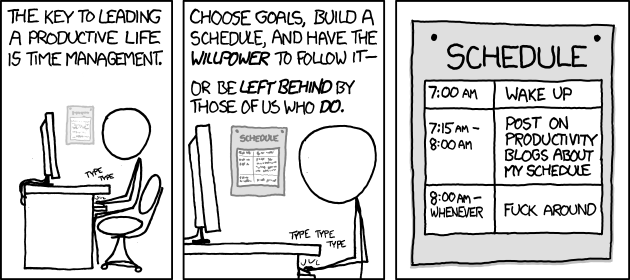In Chapter 14 of their book Applied Intelligence (2008) (not to be confused with the International Journal of Applied Intelligence) on psychometrics and cognitive processes in education, learning and creativity, psychology academics Robert Sternberg, James C. Kaufman and Elena C. Grigorenko describe twenty “stumbling blocks” in attempt to explain “Why Intelligent People Fail (Too Often)”. I list them below and, while endeavoring to get my PhD-thesis wrapped up before 2012, keep this list nearby – alongside my not-so-pretty-but-very-useful-to-me desktop wallpaper (.png, Dutch-only). I added my own preferred (amateur) way of overcoming each one in parentheses:
- Lack of motivation (choose a task that you think is important)
- Lack of impulse control (always check your outcome; don’t blindly accept the first result)
- Lack of perseverance and excessive perseverance (balance work and play)
- Using the wrong abilities (leverage what you’re good at)
- Inability to translate thought into action (split the problem into tiny Specific, Measurable, Attainable, Relevant and Time-bound steps)
- Lack of product orientation (focus on outcome, not only on the process. ISO 9001-compliance could in practice mean that you _reliably_ produce rubbish.)
- Inability to complete tasks and to follow through (consciously commit to a task, work diligently)
- Failure to initiate (decide NOW on what to do first, simply re-adjust as needed)
- Fear of failure (challenge your thoughts for irrationality and fallacies)
- Procrastination (act NOW and you feel more self-confident. “It is the job that is never started that takes longest to finish” – J.R.R. Tolkien)
- Misattribution of blame (take responsibility and accept what’s beyond your influence)
- Excessive self-pity (focus on solving your problem)
- Excessive dependency (decide yourself, accept uncertainty and incomplete information)
- Wallowing in personal difficulties (see 12)
- Distractibility (maintain a small daily todo list, keep a clean desk, don’t answer personal communication)
- Being spread too thin or too thick (do one thing and do it well; self-apply Doug McIlroy’s Unix philosophy)
- Inability to delay gratification (work according to plan, cutting corners undermines self-confidence)
- Inability or unwillingness to see the forest for the trees (remind yourself of the larger picture)
- Lack of balance between critical, analytic thinking and creative, synthetic thinking (self-apply the Six Thinking Hats)
- Too little or too much self-confidence (work diligently, be kind to yourself, know your limitations and weaknesses)
I hope this is useful.
UPDATE 2011-03-19: ….and I also hope that a single blogpost on productivity isn’t a telltale of being a slacker like in this funny XKCD entitled “Time Management” 🙂
